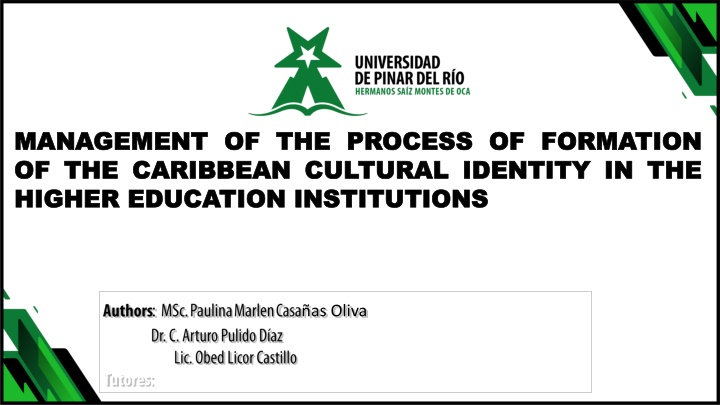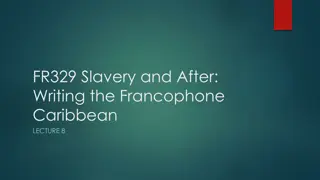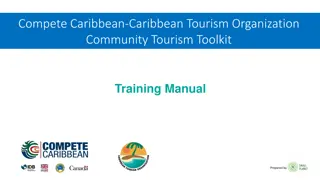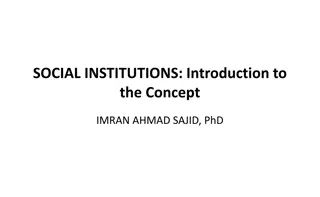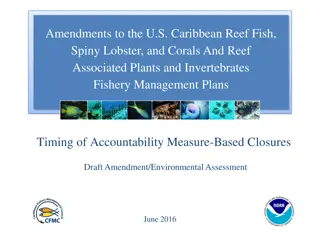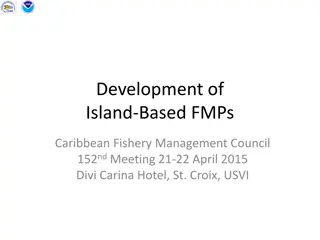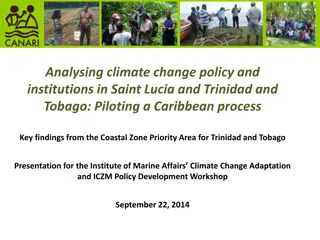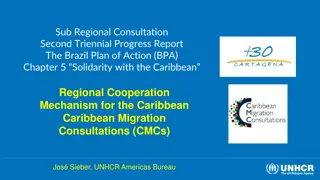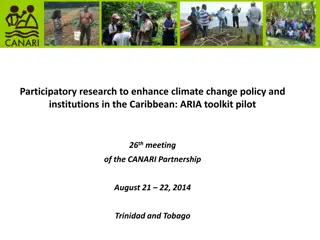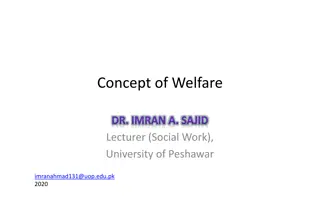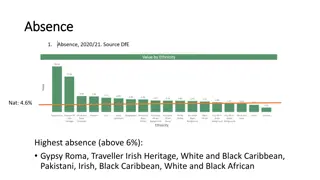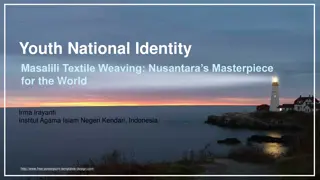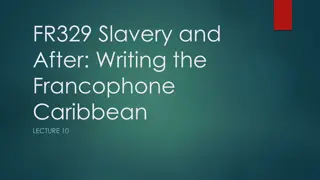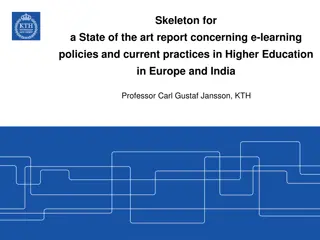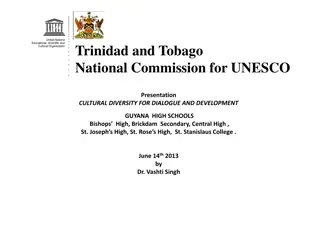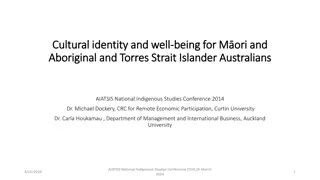Management of Caribbean Higher Education Institutions for Cultural Identity Formation
This study delves into the essence of managing higher education institutions in the Caribbean to shape cultural identity formation. It scrutinizes the intricate process and significance of cultural identity in the context of educational institutions, laying a foundation for enhancing cultural awareness and preservation. The research offers valuable insights into the pivotal role played by management in nurturing a culturally rich environment within these academic settings.
Download Presentation

Please find below an Image/Link to download the presentation.
The content on the website is provided AS IS for your information and personal use only. It may not be sold, licensed, or shared on other websites without obtaining consent from the author.If you encounter any issues during the download, it is possible that the publisher has removed the file from their server.
You are allowed to download the files provided on this website for personal or commercial use, subject to the condition that they are used lawfully. All files are the property of their respective owners.
The content on the website is provided AS IS for your information and personal use only. It may not be sold, licensed, or shared on other websites without obtaining consent from the author.
E N D
Presentation Transcript
MANAGEMENT MANAGEMENT OF OF OF THE THE CARIBBEAN CARIBBEAN CULTURAL HIGHER HIGHER EDUC EDUCATION ATION INSTITUTIONS OF THE THE PROCESS PROCESS OF CULTURAL IDENTITY INSTITUTIONS OF FORMATION FORMATION IDENTITY IN IN THE THE as Oliva
Having a strategy that allows to improve the Caribbean identity in the administrative, pedagogical communicative dimensions contributes to the management of the main processes of the university enhancing the transformation and behaviour of the social being in the know how, know how to be and know how to live together. cultural institutional, and that
THEORETICAL CONCEPTUAL FRAMEWORK DIGITAL TECHNOLOGY PROCESS OF FORMATION CARIBBEAN CULTURAL IDENTITY EDUCATIONAL MANAGEMENT
DIGITAL TECHNOLOGY VERSUS IDENTITY DIGITAL TECHNOLOGY VERSUS IDENTITY At present, power societies have great processes. These societies are usually identified with the term globalization that has enormous influence on the political, social, cultural life and it is characterized by a huge world market that relies on digital technology favoring a certain group that in turn controls the media and social networks at a global level. In facing the globalization, the identity; knowing who we are, where we are going to, stands as a weapon of resistance without which society tends to become extinct. influence on identity
Education plays an important role in the process of formation of identity because it locates the cultural historical being within the educational teaching process. This allows to educate each generation on the values that conform the inherited, assumed and enriched identity. To the extend that an individual, in this case the student, appropriates the elements that make up his cultural identity; he will be able to assume a certain attitude and develop feelings of belonging, not only towards the objects themselves, but towards what they mean, in the cognitive, affective and behavioral spheres.
According to what is being established by UNESCO- Peru (2011) educational management in the Higher Education Institutions materializes in the institutional, administrative, pedagogical and community dimensions and it is followed up by the management cycle of planning, execution, evaluation and monitoring . This is the cycle to be followed to check the different processes at the university. Formation is a social and cultural process that obbeys the character of the integrity of the development of the human transformative capacity. It is an objective process that enhances the transformation and behaviour of the social being in the know how, know how to be and know how to live together, so it leads to a process of appropriation of culture and in this sense it makes reference to the professionalizing formative activity.
IDENTITY IDENTITY Identity is analyzed from different disciplines like philosophy, sociology, psychology, anthropology; structuring the subject: personality, family, ethnicity, social group, nation, continent; as well as different spheres of reality: the cultural one, the economic one. In that sense, terms like cultural, national, personal, continental identity are used. From the psychological science the individual(personal) and group identity are analized taking into account two main aspects: the objective side, stable psychological traits that characterize certain people; the subjective side, how they believe they are and how they perceive themselves. from different levels of
UNESCO defines culture like the set of distintive, spiritual, material and affective features that characterize a society or social group . It encompasses, in addition to arts and letters , lifestyles, the fundamental human rights, the system of values, beliefs and traditions.( UNESCO,2005) Cultural identity contains within itself a sense of belonging to a social group with which cultural traits, customs, beliefs and system of values are shared. Cultural identity is a social fact since it is a necessity as an individual or as a social or collective being to reaffirm oneself against the other, to identify oneself , which comprises sociocultural, economic, linguistic, territorial aspects; historical awareness integrated into the national identity that exists through cultural identity.
The Caribbean cultural identity cannot be reduced to that of the national identity, since culture it is not a whole nation; on the contrary, it could be a far-reaching category. The Caribbean cultural identity is the historical result of the evolution of common socioeconomic complexes as expresses Moreno Fraginals. The Caribbean cultural identity is the result of the symbiosis of three races in the Caribbean space and that goes beyond the national identity of the countries that belongs to this space. L
Alejo Carpentier in The culture of the people who live in the Caribbean Sea in Carifesta 1979 talks about the common socioeconomic complexes as the plural uniqueness of the Caribbean expressed through its diversity, originality. This diversity brings about writers as Nicol s Guill n in the Spanish speaking Caribbean, Aim Cesaire, Jacques Roumain, in the French speaking Caribbean,Thomas H. McDermot under the nickname ofTom Redcam and who starts the Caribbean English speaking novel with Becka sBuckraBaby(1903). In this first period there are some other writers like De Lisser(1878-1944) Claude McKay (1890-1948) from Jamaica; Theophilus Albert Marryshow (1887-1958) from Grenade; A.R.F.Webber from Guyana; Alfred Mendes y C.L.R. James from Trinidad and tobago, Roger Mais, Jean Carew, Louisse Bennet, V. S. Reid.
BIBLIOGRAPHY BIBLIOGRAPHY lvarez, C. (2000). La escuela en la vida. Ciudad de La Habana: Editorial Pueblo y Educaci n. Carpentier, Alejo. 1981.Lo que el Caribe ha dado almundo. En Correo de laUNESCO. Carpentier, A. (1979) La cultura de los pueblos que habitan en las tierras del Mar Caribe Carifesta Cuba. Ministerio de Educaci n (2016). Plan de estudio E (modelo del profesional). Carrera Licenciatura en Educaci n. Inform tica. La Habana. Cultura e Identida dNacional. Memorias del encuentro: Cuba: Cultura e Identidad Nacional . Uni n de escritores y artistasde Cuba. Universidad de La Habana.1995 Morej n, Nancy.1996. Lengua, Cultura y Transculturaci n en el Caribe: Unidad y Diversidad, en Revista Temas.No: 6, Abr-Jun. Moreno Fraginals, Manuel.(1995). Cuba- Espa a. Espa a- Cuba. Historia Com n. Serie Mayor. Pulido D az,A, P rez Vinas y Bravo Salvador, M.(2023) Una aproximaci n a la gesti n de los procesos universitarios. Sus dimensiones. En Revista Mend ve. Vol.21, Num,1(2023) Rodr guez Pulido, J., Art les Rodr guez, J. & Pulido D az, A. (2018). Gesti n en la instituci n superior. Espa a-Cuba. Universidad de Las Palmas de Gran Canaria-Universidad de Pinar del R o.
